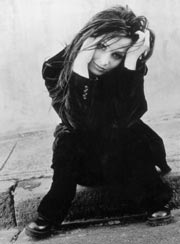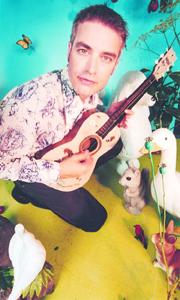ON PAPER, KASEY Chambers has ideal qualifications to become a huge country star. She’s from a working-class, even backwoods, family. She speaks with an adorable accent and flashes a pretty smile. She sings with an authentic voice that sounds like it’s trapped in the jukebox of a dusty roadhouse in the middle of nowhere. All in all, she’s a good Southern gal, except for one hitch: She’s Australian.
Kasey Chambers
Century Ballroom, Sunday, March 25
A native of southern Australia’s Nullarbor Place, the 24-year-old hasn’t let geographical obstacles bother her, although it has taken American country fans a while to discover her charms. Chambers’ 1999 debut, The Captain, was released here late last year on Warner Bros., and she’s just now undertaking her first full U.S. tour this month. On the phone from a stop in Michigan, she doesn’t sound at all anxious about her slow progression in the land of her country heroes.
“I don’t have this driving force to become really successful here,” she says. “It’s just a bonus getting to come over and tour. It’s great fun. We’re really stoked; we get a tour bus. That’s cool because we don’t have them in Australia.”
The chatty singer and her band, which includes her guitar-pickin’ father and an Australian mandolin champion, are cruising the country in style in a bus complete with beds and televisions—all thanks to Chambers’ voice. On The Captain, her wizened drawl almost always sounds on the verge of cracking, as if everything she’s saying affects her body and soul. Her songwriting reflects country tradition as well, with meditations on family, romance, and God; all she’s missing are the patriotic paeans and she’d have a masterpiece.
Well, not quite. Chambers’ melodies and lyrics are too simplistic at times, but while an easy rhyme scheme or predictable hook might sink another young artist, this one powers ahead bravely. As a result, The Captain covers a lot of ground, from wistful ballads (“This Flower,” “Southern Kind of Life”) to up-tempo—if romantically skeptical—pop songs (“You Got the Car,” “Don’t Talk Back”) to old-fashioned hoedowns (“Last Hard Bible”). Along with the opener “Cry Like a Baby”—which features the telling line, “I’m not much like my generation/Their music only hurts my ears”—and the bittersweet title track, these songs coalesce into a kaleidoscope of country styles spinning around her voice.
Chambers’ voice didn’t develop overnight. Raised in the outback, where her father made a living as a fox trader and a country music teacher, she took to singing and never looked back. Even a brief stint in a “normal” high school in her early teens couldn’t derail her. “I never really settled into the school very well,” she says. “The kind of lifestyle we lived for the first 10 years of my life was doing correspondence schooling with my mom. Then to have to go to a normal school and have a schedule and answer to people, I didn’t really do well. I left when I was 14 and went out on the road and started playing music.”
She joined her parents in the Dead Ringer Band, and the group would spend the next 10 years of Kasey’s life traveling throughout Australia, playing in clubs and concert halls. But the family that played together stayed together only for a decade. “We were all getting a little sick of it,” Chambers recalls. “My parents actually broke up. We just stopped playing. My mom and I spent some time in Africa, and after that we came back and I had to get my shit together and start doing something to be able to pay my rent.”
She turned to singing. Before long, she’d released an album, and all the way across the world, critics and DJs and talk show hosts—she made her debut on Late Night with David Letterman last November—have praised her. She’s been compared to idols and peers from Dolly Parton to Iris DeMent to Gillian Welch and, most excitingly for her, Lucinda Williams.
Mention of the great American songstress causes Chambers to beam. While recording in Nashville last week, Chambers got to sing with Williams, who’d agreed to guest on a few songs. “She’s been a big role model for me,” Chambers says.
BUT ONE QUESTION LINGERS: How did an Australian girl develop such an appreciation for American country? “I was exposed to it from an early age,” she replies. “My dad would listen to Hank Williams and Gram and Emmylou when I was growing up. It was a big part of my life. And for the first 10 years of my life, because I lived in such a remote area of Australia, we didn’t have any TV or radio, so I was exposed only to the music that my dad liked. I went through my teenage years of just listening to Metallica and stuff, but . . . country music was still always there, and I would always come back to it.”
Even now, when the country behind country has turned her native homeland into the world’s largest set for a television program—not to mention the saddening appropriation of the term “outback” for the purpose of selling steak and bloomin’ onions to mall-happy Americans—Chambers remains gracious toward her hosts.
“It doesn’t bother me at all,” she says of the stereotypes. “You come over here and everybody talks about the Crocodile Hunter or Crocodile Dundee. But it’s good that they have something to relate it to, I guess.”






